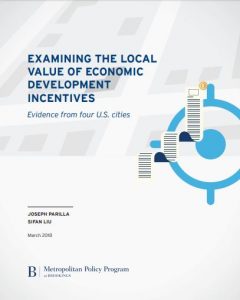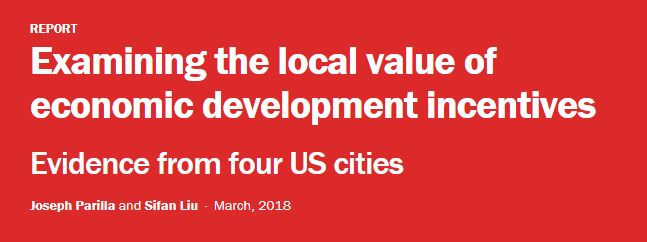New Brookings Report Examines Multi-billion Dollar Economic Development Incentives Conundrum
Report provides a rare, transaction-level snapshot into local and state governments’ economic development incentives in four U.S. cities
Brookings Metropolitan Policy Program released a new report, Examining the Local Value of Economic Development Incentives: Evidence from Four U.S. Cities, by Joseph Parilla and Sifan Liu. The report explains why U.S. local and state governments deploy $45 billion to $90 billion in economic development incentives each year, reviews decades of evidence on their effectiveness, and then draws on unique transaction-level data between governments and businesses in Cincinnati, Indianapolis, Salt Lake, and San Diego to examine how incentives align with core principles of inclusive economic development.
The significant tax breaks some cities and states have offered in the competition to land Amazon’s second headquarters have ignited controversial debates about the effectiveness of economic development incentives.
Evidence suggests incentives have struggled to strongly influence economic growth and opportunity in cities and states partly because, the authors argue, they have not been strategically targeted to businesses and industries that can offer the greatest economic and social benefit. The report’s authors contend that key policymakers and stakeholders—mayors, governors, economic development officials, and other local and state institutions—must evolve the principles and policies they use to target economic development incentives.
“Thriving cities and regions are able to master the global scale and technological complexity of the advanced economy and address entrenched and exclusionary biases that prevent all workers and communities from meeting their productive potential,” said Brookings fellow and co-author Joseph Parilla. “There is no reason policymakers cannot use incentives to build inclusive economies, but that demands an evolution that embraces more strategic firm targeting, rigorous evaluation, and greater public disclosure.”
Key findings include:
-Economic development incentives remain a core aspect of local and state economic development, with cities and states spending between $45 billion and $90 billion per year on incentives nationwide;
-High-profile competitions for projects like Amazon’s HQ2, along with skepticism about incentives’ effectiveness, have brought a renewed public interest and scrutiny to incentives;
-In Cincinnati, Indianapolis, Salt Lake, and San Diego, incentives align with many principles of inclusive economic development but fall short on others.
Read full report: https://brook.gs/2oQFKUV







